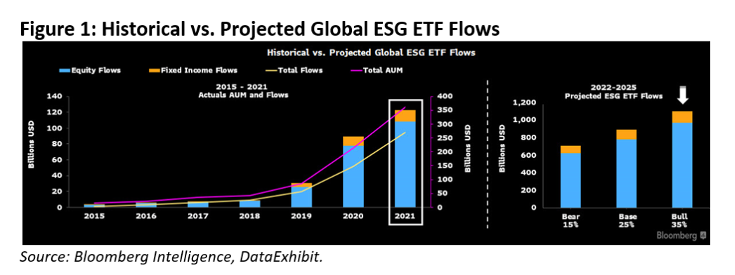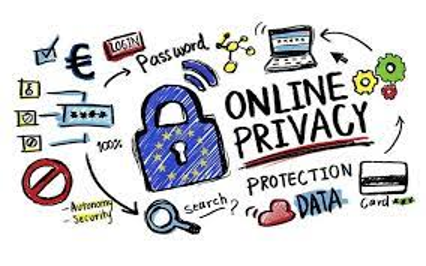Gema Esteban Garrido, Global Head of ESG, IG4Capital
First of all let’s talk about the overall size of the whole ESG market. According to Bloomberg Intelligence (Fig 1) Assets Under Management (AUM) are going to exceed USD41 trillion in 2023 and USD50 trillion in 2025, which will represent one third of AUM in the world. This means that ESG is not just a passing fad, but is definitely here to stay.
Secondly, according to a survey conducted by MSCI of 200 Asset Owners, 62% cited climate change or ESG measurement as a top 3 impactful trend in the next 3–5 years and 73% planned to increase ESG investment either significantly or moderately by the end of 2021. Therefore, capital allocation whether is in equity or fixed income is very much growing in the telco ESG world. For example, again, a MSCI study published in April 2022 revealed that more than 1 trillion$ of investment in communications is in ESG mutual funds and ETFs.1 Also since Telefonica became the first in the telecommunications industry to issue a Green bond back in January 2019, amounting to EUR1 billion, it has become very common to see telcos issuing sustainable bonds.
Governments are also focusing on ESG
Regulators and policy makers are equally focused on ESG. On 23 Feb 2022 the European Commission adopted a proposal for a Directive on corporate sustainability due diligence. The proposal aims to foster sustainable and responsible corporate behaviour throughout global value chains. It also aims to anchor human rights and environmental considerations in companies’ operations and corporate governance2. While acknowledging that a number of EU Members States have already introduced national rules on due diligence and some companies have taken measures at their own initiative, the EU stated that there is need for a larger scale improvement that is difficult to achieve solely through voluntary action.
This is significant, because previously there was only a voluntary obligation to report on ESG criteria. This due diligence requirement could be a compliance watershed moment for identity and data markets similar to the impact felt in the financial markets as a result of the US Sarbanes Oxley (SOX) Act of 2002. This Act mandated certain practices in financial record keeping and reporting for corporations and it kicked off strong growth in the Enterprise IAM market.
Why and how should companies and telcos focus on ESG?
Raising ESG standards and practices will drive three major outcomes for companies:
- First, it answers rising consumer demands for more sustainable and ethical products and practices. 76% of consumers say they will stop buying from companies that treat the environment, employees, or the community in which they operate poorly [PwC] and 88% of consumers will be more loyal to a company that supports social or environmental issues [Cone Communications].
- Second it may improve efficiencies or increase revenues.
- Third, companies will have access to cheaper capital and better valuations.
Then, companies need to work out which particular ESG topics they should focus on. It is extremely important to understand the company core business and focus on the financially material topics for that industry/company. In particular, I suggest that two areas that telcos should concentrate their efforts on are Environmental and Social issues.
Environmental
The telecoms industry is focusing on GHG emissions and waste management. In a joint study, Telefónica and Nokia demonstrated that 5G is up to 90% more efficient than legacy 4G in terms of energy consumption per traffic unit. Also fiber is 85% more energy efficient than copper, primarily as a result of the decommissioning of the copper from homes with broadband. For example, the decision to completely dismantle the old network together and replace it with new fiber infrastructure has enabled Telefónica, in Spain, to save 208 GWh of energy between 2016-2018, which equates to 56.5 KtCO2 being avoided between 2016-2018.3
In its 2022 Mobile Industry Impact Report4, the GSMA also suggest that through digitalisation, such as with smart grids, cities, buildings and transportation, we could save 7.7 billion tonnes of CO2 emissions per year (more than 10% of total GHG Emissions).
The report also points out that an ESG focus is becoming business critical for all operators, and that this is why the GSMA has developed a new industry specific response with new reporting benchmarks:
“With stakeholders getting smarter and more discerning when it comes to ESG claims, an effective and consistent approach to measuring and communicating performance is more important than ever. The GSMA has recently launched ESG Metrics for Mobile, a first-of-its- kind mobile-sector ESG reporting framework featuring 10 industry specific KPIs. The sector-specific ESG data metrics will deliver a more consistent, comparable and decision-useful view of the industry’s most material impacts and drivers of value, allowing for more effective and meaningful communication between operators and their stakeholders”.
Most operators are already reporting on the number of devices that they collect to prevent e-waste, such as the 229 million devices collected by AT&T, which were refurbished or recycled. Another example is from Orange, which reported that it collected mobile phones equivalent to 15.1% of its sales volumes in Europe in 2020.5
Social
There are some key business aspects of ESG like digital inclusion and child protection which are focused on reducing the digital gap with rural populations or the elderly, as well as educating children in the safe use of digital services. It is estimated that more than a billion people worldwide are living with a disability. The largest group is the hearing impaired followed by the vision impaired and then also the other physically and cognitively impaired.
However, the statistics are notoriously unreliable and there is no single reliable source of data. Suffice it to say that it is a big number and represents a significant proportion of the telco industry customers in all markets. And, because of their impairments, these customers require different forms of personalisation and customisation to meet their individual needs. In fact, because of the lack of suitable access, a portion of this billion people cannot use many of the digital services that we think of being mainstream requirements today.
Promoting digital confidence
But let’s zoom in on data privacy. Article 12 of the UN’s Declaration of Human Rights stipulates that no one shall be subjected to arbitrary interference with his privacy.
In the digital space it is paramount to promote freedom of expression and privacy on the internet through practices which respect and protect users’ rights.
For investors and from a governance perspective transparency is required on policies, data enquiries, data deletion and data security breaches, fines etc. I like to call it digital confidence because, for customers, TRUST is probably the most important value when they set up a digital relationship with you.
Digital Confidence is based in three fundamental pillars that work together: privacy, transparency and security. People must have assurance that:
- companies will not use their data in an unexpected, obscure or abusive way;
- customers will be informed about who handles their data and what purpose it is used for;
- their data will be deleted according to a predetermined policy, and it will be retained also when they request it by exercising their cancellation or retention rights;
- they will have the necessary tools so that they can access and update their personal information; and
- there are robust security measures and technical resources in place to avoid the loss, misuse of, or unauthorized access to their data.
According to the RDR Telco Giants Scorecard6, the scorecard ranks 12 of the world’s most powerful telecom companies on their commitment to protect user’s freedom of expression and privacy rights. None of the 12 telecommunications companies that were evaluated earned a passing score. Though Big Tech companies have received most attention in recent years in terms of their negative assessment against these criteria, the findings of the RDR Scorecard show that, year after year, telcos are themselves failing to address the same digital rights harms while facing far less scrutiny. And yet, despite being less visible than their Big Tech counterparts, telcos wield far more power.
In summary I would say that customer relationships based on TRUST are one of the most material issues for telcos when dealing with ESG and a main challenge for the whole industry.
1 https://www.msci.com/documents/1296102/24720517/Top-20-Larg- est-ESG-Funds.pdf
2 https://ec.europa.eu/commission/presscorner/detail/en/ip_22_1145
3 Fiber networks have 100 times more capacity than the equivalent cable, use 85% less space and have 4 times the distance capacity to premises, which allows the decommissioning of old technology resulting in huge energy sav- ings.
4 https://www.gsma.com/betterfuture/wp-content/uploads/2020/03/ GSMA_TheFutureofMobile-1.pdf
5 https://www.orange.com/en/oranges-commitment-environment
6 https://rankingdigitalrights.org

Gema Esteban Garrido has an Advanced Management degree from IESE Business School, an Investment Management degree from the University of Geneva, and a bachelor’s degree in Computer Science from Universidad Pontificia de Salamanca in Madrid. Gema is Global Head of ESG at IG4 Capital, a private equity firm where she is responsible for fully embedding ESG into its Investment Cycle as well as driving its portfolio companies towards the highest ESG standards. She is president of the ESG Committees of the Board in IGUÁ Saneamento (water infrastructure), OPY Health (healthcare infrastructure), CLI (agrilogistic), AENZA (Infra) and ADELCO (B2B logistics). She serves as Board member at AENZA infrastucture. Prior to joining IG4 Capital, Gema spent several years at Telefónica, most recently as ESG Investors Director (2018-2020), where she revamped Telefónica’s ESG strategy in order to attract ESG investors and positioned the company as a leader amongst the most influential ESG ratings, where Telefónica consistently achieved a top 5 ranking. Prior to joining Telefónica she worked at British Telcom and in the software industry. She is an expert in ESG investing and digital strategy. She is able to develop future strategic insights and embed ESG parameters in the company strategy focusing on company value generation. She is associate professor in the Corporate Governance Center of ESADE and IE Business School where she teaches Digital Strategy and was awarded in 2010 with a MAKE award (Most Admired Knowledge Enterprise).
[email protected] @geg86






